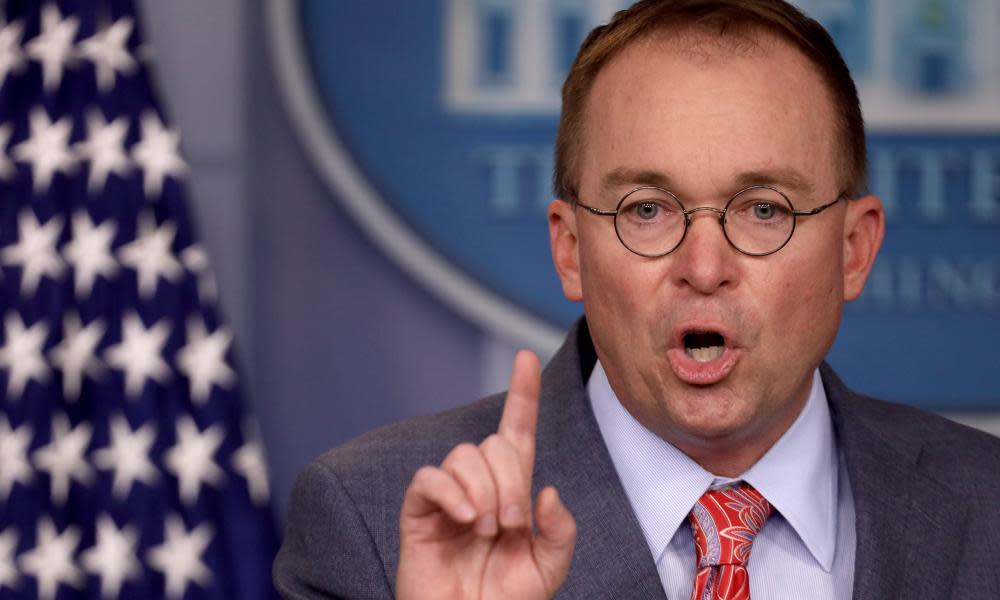US ‘very concerned’ over Huawei’s role in UK 5G network

Donald Trump’s acting chief of staff has warned there could be “a direct and dramatic impact” on the sharing of intelligence between the US and UK if Boris Johnson’s government goes ahead with allowing Huawei to supply equipment to build the British 5G mobile phone network.
Mick Mulvaney’s remarks represent one of the most forceful warnings yet by senior Trump administration officials, who have repeatedly made clear their concerns about the British decision to allow the Chinese company to supply its technology.
Speaking to an audience at the Oxford Union on the eve of a meeting he was due to have with Dominic Cummings and other British senior aides at Downing Street, Mulvaney said the US was “very much concerned” about the issue.
Related: Huawei ruling will cost us £500m, says BT
“Our governments share a tremendous amount of security information,” he told his audience at a behind-closed-doors event on Wednesday evening for student members of Oxford’s high-profile debating society.
“We are very much concerned that integrity of that information is hardwired into your computer systems, and if you folks go forward with the decision to include Huawei, it will have a direct and dramatic impact on our ability to share information with you. Period, end of story.”
Mulvaney is due to come to Downing Street on Thursday for a meeting with Cummings, Johnson’s influential chief aide, and his direct counterpart, chief of staff Sir Edward Lister. Sources said that he was not expected to meet with Johnson himself, however.
The US has been trying to downplay the significance of the visit to London since news of it first leaked late last week, although pressure from the White House has remained high a month after the UK announced it would allow Huawei kit to be used in the new 5G network.
In the past week Mike Pompeo, the US secretary of state, and Mark Esper, the defense secretary, have both warned about Huawei, while Trump called the US ambassador to Germany on Sunday night to pass on his concerns.
Britain’s spy agencies believe that any surveillance risk from Huawei can be contained, and that they are familiar with the Chinese company’s technology, which has been used in both 3G and 4G networks. But the US – often engaged in trade conflict with China – insists there is a security problem.
Mulvaney is coming to London with Robert Blair, the White House’s special representative for international telecommunications policy and the lead US official with day-to-day responsibility for Huawei. Blair is expected to hold meetings with British experts and politicians concerned about the Chinese company.
The critical meeting comes amid speculation that the White House wants the UK to commit to removing Huawei from British mobile phone networks in the near future, perhaps three to five years’ time, given that it is already a leading supplier to UK phone companies.
The UK plan is to limit Huawei to a cap of 35% for each of the country’s four mobile phone operators, Vodafone, O2, EE and Three, although it will require the consent of parliament. Eliminating Huawei immediately would cost hundreds of millions more and would delay the rollout of 5G by a couple of years, officials say.
Mulvaney arrived in Oxford, via Belfast where he had meetings with the Democratic Unionist party leader and Stormont first minister Arlene Foster, and with Michelle O’Neill, the deputy first minister from Sinn Féin – a day after meeting the Irish prime minister, Leo Varadkar. He claimed that had been his principal reason for visiting.
“I introduced myself to some of the leaders in Northern Ireland so we can make sure that lines of communication would be open between the United States and Northern Ireland. My country has some ideas of honest broker that involve Ireland and Northern Ireland,” he said in Oxford.


